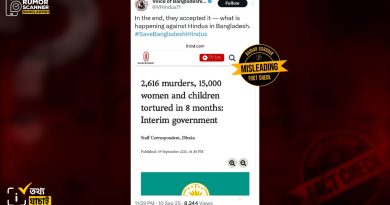From January to June, a total of 1,795 false claims were identified.
In the second quarter, the rate of false information increased by around 14%.
Dr. Muhammad Yunus was the most targeted individual.
Among political parties, Awami League appeared most frequently in disinformation.
The Iran-Israel conflict was the top issue with the highest number of false claims.
74 cases involved the military, and 30 involved the police.
Communal disinformation and Indian media propaganda have decreased.
333 false claims were linked to 61 media outlets across 308 incidents.
Key Findings (January–June 2025)
Rumor Scanner identified 1,795 instances of misinformation in Bangladesh during the first half of 2025, marking a 30% increase from the same period in 2024 (1,380 instances). Compared to Q1, the second quarter saw a 14% rise in misinformation, driven by political developments, upcoming elections, and global events.
Meta Platforms Flooded with Fake Information
Rumor Scanner identified:
- 1,661 false claims on Facebook
- 255 on Instagram
On average, over nine false posts were spread daily on Facebook. - YouTube: 311
- X (Twitter): 257
- TikTok: 133
Besides social media, 90 instances of false news, images, or videos were found in Bangladeshi mainstream media.
Indian media circulated at least 25 misinformation incidents involving Bangladesh.
Breakdown by Type
From reports published in Q1 and Q2:
- 1,125 fully false events
- 386 rated misleading
- 278 rated distorted
- 6 sarcastic or humorous content misinterpreted as real
Fact-checking included:
- 709 texts, 336 images, and 750 videos
Political and International Misinformation Rose in Q2
- Q1 (Jan–Mar): 837 false claims
- Q2 (Apr–Jun): 958 (14% rise)
- Facebook misinformation rose 22% in Q2
- Instagram: 180% rise
- Threads: 100% rise
- YouTube: 51% rise
- X (Twitter): 41% decline
- TikTok: roughly constant
National and religious misinformation fell by 14% and 44%, respectively.
But political misinformation rose 5% (from 346 to 364), and international issues surged 312%.
Entertainment/literature misinformation rose 87%, mostly involving actress Sadia Ayman.
In sports, false claims dropped 14%; Tamim Iqbal was most targeted (9 instances).
Awami League vs BNP-Jamaat: Two Sides of Political Propaganda
- Awami League and affiliates were targeted in 241 false claims, 59 directly against the party.
- ~86% of those portrayed them positively.
- Prime Minister Sheikh Hasina was linked to 85 cases, 80% favorable.
- BNP was targeted in 183 false claims, including 47 against the party.
- ~94% portrayed them negatively.
- Mirza Fakhrul: 24 claims, 87% negative
- Tarique Rahman: 21 claims, ~52% favorable
- Jamaat-e-Islami: 142 false claims
- 55 against the party, 93% negative
- Amir Dr. Shafiqur Rahman was targeted 22 times, 91% negative
- New Party NCP (formed Feb 28): 86 false claims
- All 17 party-related false claims were negative
- Convener Nahid Islam: 11 claims, all negative
- South Zone Organizer Hasnat Abdullah: 27 claims, all but one negative
Interim Government Also Regular Target
After the fall of the Awami League government, the interim government led by Dr. Yunus took office on August 8, 2024.
- In 2024:
- 135 false claims about the government
- 110 about Dr. Yunus
- In 2025 (Jan–Jun):
- 69 against the government (91% negative)
- 112 against Dr. Yunus (88% negative)
Total since taking office:
- Government: 204 false claims
- Dr. Yunus: 222 false claims
Also, 68 false claims targeted 12 advisors and Press Secretary Shafiqul Alam, including:
- Dr. Asif Nazrul: 14
- Jahangir Alam Chowdhury & Asif Mahmud Sajib Bhuiyan: 11 each
Security Forces as Targets
114 false claims involved law enforcement and armed forces—up 78% from last year:
- Army: 74 (vs. 42 last year) → 76% rise
- Army Chief Gen. Waker-Uz-Zaman: 25 claims
- Police: 30 (up 150%)
- IGP Baharul Alam: 1
- DMP Commissioner Sajjat Ali: 2
- Former IGP Moinul Islam: 1
- Air Force: 4
- Navy: 1
- RAB: 2
- BGB: 3
Election Misinformation Rising
Since a tentative election timeline (early Feb 2026) was announced, election-related falsehoods have increased:
- 66 election-related false claims in six months
- 42% occurred in June
Many involved fake/edited statements by political leaders and manipulated media photo cards.
Iran–Israel Conflict Fueled the Highest Single-Issue Misinformation
Following Israel’s strikes on Iran’s nuclear and military sites on June 13, 2025, massive misinformation spread online:
- 76 fact-checks published
- 75% portrayed Iran as attacker
- 73% of destructive videos falsely claimed Israeli damage
- AI was used to create fake videos and repurpose old footage
Dr. Yunus’s Resignation Rumor Flooded Misinformation
On May 22, Dr. Yunus reportedly discussed resignation due to internal challenges.
Between May 22–25, Rumor Scanner identified 16 false claims about the resignation rumor—highest for any single narrative this year.
34 Issues, 393 False Claims
Across 34 topics, 393 false or misleading claims were tracked over six months.
Concerns Over Google’s VEO 3
AI-generated misinformation is rising.
Google’s VEO 3, launched in May 2025, allows ultra-realistic video generation.
At least 8 fake videos using this tool were detected by Rumor Scanner last month.
Communal Disinformation & Indian Media Propaganda Declined
- 106 communal misinformation incidents in six months
- Q1: 78
- Q2: 64% drop
- 59% came from Indian accounts/pages
- 38 false reports from 31 Indian media outlets involving Bangladesh
- AajTak Bangla ranked highest with 9 cases
Fake Media Photo Cards Still Rampant
Media branding is regularly misused:
- 308 incidents
- 333 false claims
- 61 media outlets falsely attributed
- Most used: Jamuna TV (51)
- Then: Janakantha (26), Kaler Kantho (25)
Methodology
The data is based on Rumor Scanner’s published fact-check reports between January and June 2025.
Reports were logged into a central database, then analyzed and compared with the previous year.
Each piece of misinformation was evaluated for positive or negative framing. If a false claim aimed to enhance someone’s image, it was labeled positive; if damaging, it was labeled negative.






